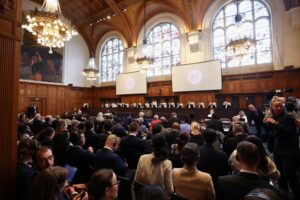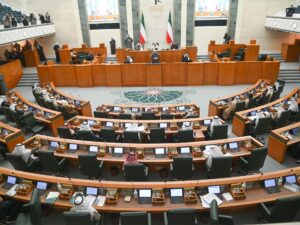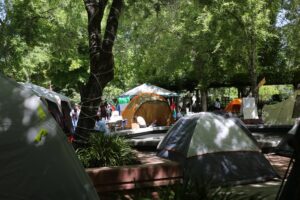
The National Interest Foundation Newsletter
Issue 237, May 17, 2024
Welcome to our NIF Newsletter. This week, we look into South Africa urging the International Court of Justice (ICJ) to order Israel to halt its devastating assault on Rafah, explore how the latest dissolution of parliament in Kuwait could be different from previous times, and analyze how some universities have responded to student anti-war protests like a police state bowing to political pressure and financial favors while a few others elicit praise for their productive handling of them.
South Africa Urges the ICJ to Order Israel to Halt Its Devastating Assault on Rafah

South Africa is requesting that the court order additional provisional measures against Israel due to the matter being of extreme urgency. (Photo from Reuters)
South Africa Urges the ICJ to Order Israel to Halt Its Devastating Assault on Rafah
On Thursday of this week, the world’s top court – the International Court of Justice (ICJ) – began hearing arguments from South Africa regarding Israel’s brutal and universally-condemned military assault on the Gazan city of Rafah. In making their case against the Israeli offensive, South Africa is calling on the ICJ to order that it be halted and for more emergency provisional measures to be issued. The arguments for the ICJ to stop the attack on Rafah were made by numerous lawyers, legal experts, and officials, with South Africa and its representatives outlining the abusive nature of Israel’s military campaign, statements of ill intent from Israeli officials, and the repeated blocking of humanitarian aid. South Africa is making its case while humanitarian agencies warn that at least 600,000 civilians have recently been forcibly displaced from Rafah by Israel. This comes after an estimated 1.5 million had been seeking refuge there from the war, having already been uprooted from their homes in other areas across Gaza.
During their arguments denouncing the assault on Rafah, South African lawyers and their allies cited statements from Israeli officials themselves publicly describing the aim of the Rafah offensive as “total annihilation.” They also provided details of the utter destruction of non-combatant infrastructure such as schools and hospitals, where mass graves of medical workers, women, and children had been uncovered, warning that a failure to halt the operation in Rafah would result in similar findings. South Africa highlighted the irreparable harm posed by the Israeli assault on Rafah, and how it would only serve to exacerbate the already dire humanitarian conditions for civilians in Gaza. This is due to the fact that Rafah is Gaza’s primary hub for humanitarian assistance, and aid agencies have already communicated that the closure of the crossing there has significantly hindered their vital operations. Some commentators have expressed a belief that South Africa’s case is strong enough for the ICJ to issue additional provisional measures in Gaza, especially considering that humanitarian conditions have not improved even after their earlier orders for Israel to facilitate better flow of aid.
South Africa’s urging of the ICJ to order a halt to Israel’s military assault on Rafah comes on top of its landmark case accusing Israel of genocide which was put forth several months ago. While the main case could take years before a final decision is reached, back in late January the ICJ did find in an interim judgement that the allegations against Israel fell within the provisions of the Genocide Convention and that the claims of violations of human rights were justified. Thus, the ICJ ordered Israel to take multiple provisional measures. As part of its recent arguments on Thursday, South Africa’s representatives repeatedly referred to these aforementioned rulings – which it said Israel had failed to comply with. They pointed out that “for the court’s previous orders to be effective, and for the provision of humanitarian aid to be done urgently and at scale, Israel has to be ordered to stop its military offensive” in Rafah. South Africa has also asked the ICJ to order Israel to allow unimpeded access to Gaza for UN officials, humanitarian aid agencies, journalists, and independent investigators.
Analysts have speculated that the ICJ’s urgent and expedited hearings regarding the military assault on Rafah could spell more trouble for Israel, as they indicate a huge concern about the humanitarian devastation of the offensive. It has been posited that new orders could be issued against Israel in the coming days. Lawyers for Israel presented their arguments to the ICJ today, which were dismissed by fair observers as being at odds with the reality on the ground in Rafah. As one pundit put it, “There is a difference between the reality on the ground and what Israel is trying to present to the international community.” In the hearings yesterday and today, South Africa and Israel were each given two hours to make their respective case on the newest request for emergency measures. A decision on this from the ICJ is expected over the next week. While the ICJ has no way of formally enforcing its rulings, possible further measures against Israel would only add to the overwhelming international criticism and pressure regarding its military assault on Rafah.
The Latest Dissolution of Parliament in Kuwait Could Be Different from Previous Times

Observers have highlighted how there is a lot of political uncertainty in the aftermath of the recent move. (Photo from Reuters)
The Latest Dissolution of Parliament in Kuwait Could Be Different from Previous Times
Kuwait’s most recent dissolution of parliament has evoked concern regarding the potential curtailing of freedoms in the Gulf country. Amid continuing political gridlock, Kuwaiti Emir Sheikh Mishal Al-Ahmad Al-Jaber Al-Sabah dissolved parliament late last week, taking over some of its duties and also announcing the suspension of various articles of the constitution. All of this comes merely weeks after elections were held in Kuwait back in early April following the February 2024 dissolution of parliament. The April-elected parliament members had not yet begun their new session or been sworn in. Experts have pointed out the conundrum that Kuwait is currently facing, whereby it appears to be trying to initiate a desire to restore some functionality to its paralyzed political system but in doing so risks sacrificing its range of civic and political rights. For many, what is particularly worrying is the seemingly open-ended and possible long-standing nature of the latest dissolution, with the Kuwaiti head of state calling it a “transitional period” in which time would be used to review “all aspects of the democratic process” in the country.
The suspension of parliament and articles of the constitution has understandably been deemed a serious threat to Kuwait’s semi-democratic political system, a rarity in the Gulf region. Of the numerous articles of the constitution that have been suspended, there are a couple that are especially alarming. First is the article which requires that a new parliament be elected within two months of the dissolution of parliament, and the second is the article which necessitates that laws must be approved by both parliament and the emir. The fact that these two articles have been suspended indicates that the move could be indefinite and different from previous dissolutions of parliament. The Kuwaiti political system usually relies on a delicate balance between the monarchy and an elected parliament, where the latter wields significant powers and is more than a mere institution for show as it is in some other countries in the region. In Kuwait, the emir needs parliamentary approval to install his government and ratify laws.
As opposed to triggering fresh elections for a new parliament as would normally be the case, the latest move saw a new one – headed by the emir’s nephew – be appointed by royal decree. Additionally bothersome is that while dissolutions leading to new elections in Kuwaiti politics have been relatively frequent, parliamentary suspensions have only happened twice before: back in 1976 and 1986. From 1976 to 1981 and from 1986 to 1991, then-Emir Jaber Al-Sabah suspended the legislative body, eventually restoring it both times after popular outcry. Thus, as some analysts have pointed out, the latest move presents the biggest challenge since then to the tradition of a democratically-elected parliament in Kuwait and risks entrenching governmental autocracy like in nearby Saudi Arabia and the United Arab Emirates – both of whom congratulated Kuwait for the course of action. It also leaves a few wondering if behind-the-scenes efforts are taking place to try and persuade Kuwaiti authorities to sign on to the folly of the Abraham Accords.
There are various key factors that have led to the current state of affairs in Kuwait. One of these is that the political deadlocks and turmoil in the country have intensified over the past several years. Members of parliament have accused the government of corruption while the Kuwaiti cabinet has criticized the conduct of parliament, stating that the legislative body has blocked planned economic diversification. This has seen Kuwait lag behind its Gulf neighbors in this and infrastructure development. As a result, according to issue experts, Kuwait’s emir seems to be signaling that he prioritizes national development and stability over other considerations and is therefore willing to initiate this type of a move. Furthermore, Kuwait has been plagued with high levels of parliamentary turnover and cabinet resignations, meaning that officials have lacked time to execute their policy agendas. Observers have also drawn attention to how the latest move in Kuwait is part of an unsettling regional pattern of suppressing any free elements of society, as exhibited in places like Saudi Arabia, the United Arab Emirates, and Bahrain.
Unlike these other countries though, one can only hope that because of Kuwait’s long history of a democratically-elected parliament and free press, any potential clampdown on this will be met with robust resistance. The latest political actions in Kuwait will certainly test this.
Some Universities Respond to Protests Like a Police State Bowing to Political Pressure and Financial Favors

Sacramento State is among the few universities that have been praised for a constructive response to the student anti-war protests. (Photo from The State Hornet)
Some Universities Respond to Protests Like a Police State Bowing to Political Pressure and Financial Favors
While various universities and law enforcement agencies have been justifiably criticized for heavy-handed responses to student anti-war protests on college campuses across the country, with some schools acting like a police state and bowing to political pressure and financial favors, a few have elicited praise for their productive handling of them. Schools such as Sacramento State, Evergreen State College, Brown University, and Rutgers University – among a few notable others – reacted to the solidarity movement in a non-escalating and constructive way. Unlike too many institutions, that unfortunately militarized their campuses and as a result smeared and antagonized participants, these universities deserve commending for their civil approach to the situation which saw them consider and even agree to at least some of the student protesters’ demands. In most cases, student protesters were merely asking for transparency into their universities’ investments and to divest from weapons manufacturers that are increasingly under criticism for their complicity in Israeli war crimes and human rights violations. Thus, other schools should take note of how to appropriately deal with these very reasonable and fair requests, instead of forcefully cracking down on peaceful expression of free speech and allowing for the brutalization of their own students and faculty.
The universities that responded positively not only considered and agreed to some of the student requests, but they also defended their right to voice these issues and have a platform to do so. At Sacramento State for example, in the memo that the school released outlining their policy updates in response to the Gaza solidarity encampment and student protests, university officials labeled the actions as “cornerstones of higher education and democracy” and affirmed students’ ability to take part in peaceful activism. This was a welcome development and encouraging to see, especially given that administrators at other universities regrettably chose to vilify protest participants and call on armed law enforcement to occupy their campuses – as if the peaceful demonstrations were somehow a grave threat to maintaining order. As opposed to unnecessarily militarizing their university campuses, colleges like Sacramento State admirably decided to engage in healthy, democratic, and productive dialogue with students to fittingly address their concerns.
Consistently across the board, one of the main demands of student protesters involved in the anti-war solidarity movement was to initiate transparency into the investments process of their universities. Some of the schools that responded positively to the protests agreed to post all public information on investments to their respective websites and discuss these processes with students. Many even instated an array of committees comprised of both students and faculty to focus on socially responsible investing and divestment from companies that profit from human rights violations. The commitments from some universities to increase investment transparency were celebrated by social justice advocates as useful incremental steps, with the hopes that schools would look to them as an example for future actions. Due to the growing and widespread nature of the anti-war protests at universities throughout the nation, there is also optimism that this will become a more mainstream demand and topic of conversation as well.
What transpired at Sacramento State and the other aforementioned universities was a valuable lesson in how to effectively handle peaceful protests with dialogue instead of violence. As Sacramento State University President Luke Wood aptly put it in describing his school’s response to the protests, “the message here is to create an environment where people can engage in honest and open dialogue, without being vilified or canceled.” This humane approach was certainly applauded by students involved in the solidarity movement and those affiliated with the university, as the school’s Academic Senate also hailed the president for his use of open dialogue and resolution over administrators’ methods at many other colleges across the country which relied on unwarranted police force. Just as the troubling militarization of campuses and police brutality which has been too commonplace since the onset of this wave of anti-war protests deserves condemnation, on the flip side, the manner of the responses from Sacramento State and those like it are uplifting and worthy of favorable acknowledgement.
